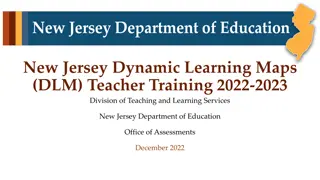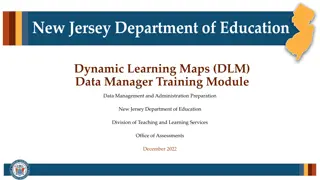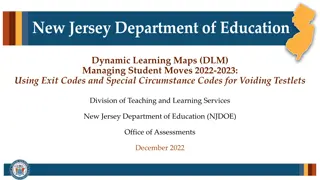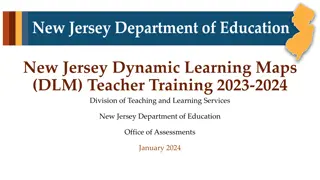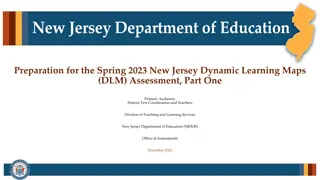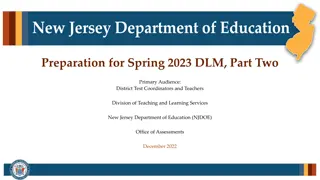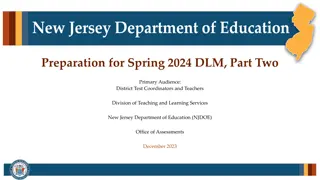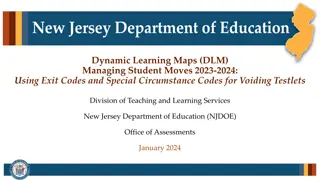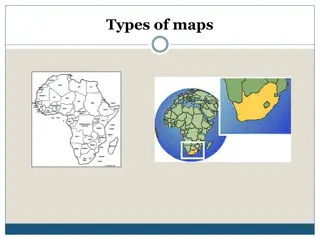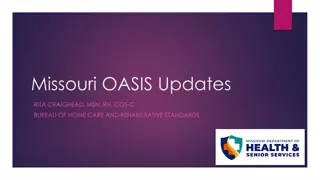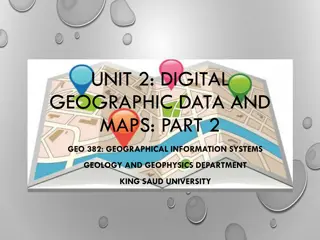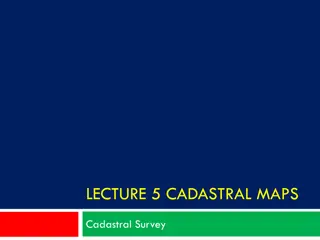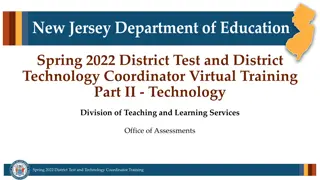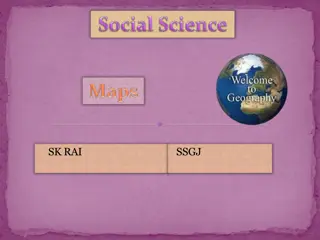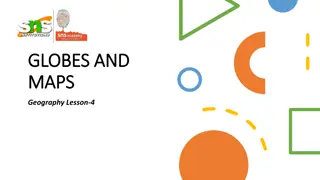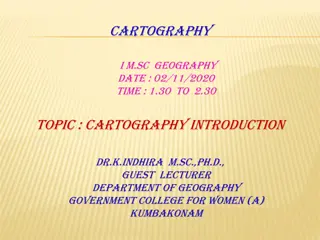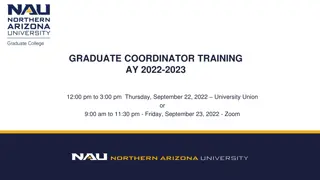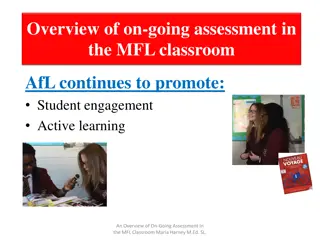Dynamic Learning Maps (DLM) Assessment Coordinator Training 2022-2023
This training presentation by the New Jersey Department of Education provides essential information for district assessment coordinators to prepare for the Dynamic Learning Maps (DLM) spring assessment. It covers the guidelines, roles, and responsibilities of assessment coordinators, ensuring all necessary tasks are completed. The presentation also outlines the purpose of the DLM assessments, focusing on including all students in the accountability system and measuring performance based on state standards through alternate assessments. Moreover, details about the DLM Year-End model in ELA, mathematics, and science are discussed, along with the testing window for ELA, Math, and Science set from April 3 to May 26, 2023.
Download Presentation

Please find below an Image/Link to download the presentation.
The content on the website is provided AS IS for your information and personal use only. It may not be sold, licensed, or shared on other websites without obtaining consent from the author. Download presentation by click this link. If you encounter any issues during the download, it is possible that the publisher has removed the file from their server.
E N D
Presentation Transcript
New Jersey Dynamic Learning Maps (DLM) Assessment Coordinator Training 2022-2023 Division of Teaching and Learning Services New Jersey Department of Education Office of Assessments December 2022
Table of Contents Topic: Found on Slide(s): Purpose of Presentation Slide 3 Basic New Jersey DLM Information Slides 4 10 Kite Portal Slides 11 12 Student Participation Slides 13 26 Grade-Level Policies Slides 27 34 District Level Roles and Responsibilities Slides 35 38 District and School Assessment Coordinator Responsibilities Slides 39 54 Student Surveys Slides 55 56 School Preparation Slides 57 61 More Information and Phone Contacts Slides 62 67 2
Purpose and Guidelines This presentation s purpose is to: Assist districts, particularly assessment coordinators, in preparing for the Dynamic Learning Maps (DLM) spring assessment. Communicate basic information on the DLM and the role and responsibilities of District and School Assessment Coordinators. Guidelines: Please review this presentation with all appropriate staff in your district and ensure that all required tasks are completed. Additional presentations for Assessment Coordinators and teachers serving as Test Administrators, and Data Managers are also available on the NJ DLM website. 3
Alternate Assessment in New Jersey Alternate assessments measure performance of students with the most significant intellectual disabilities on grade-level linked skills based on state standards. Alternate assessments also ensure that all New Jersey students are included in the State s accountability system. The DLM assessments in English language arts (ELA), mathematics, and science assess Essential Elements which are aligned to the New Jersey Student Learning Standards (NJSLS); the DLM is the alternate to the NJ general assessments for all subjects. 4
Dynamic Learning Maps (DLM) NJ uses the DLM Year-End (YE) model in ELA, mathematics and science. ELA and math are administered in grades 3 through 8 and grade 11. Science is administered in grades 5, 8, and 11. 5
Test Window for ELA, Math, and Science The NJ DLM test administration window is April 3 to May 26, 2023. Districts should begin testing early enough to ensure completion during the testing window. The testing window includes time to: accommodate students who are assessed in three subject areas and/or were absent early in the testing window; and accommodate school breaks, holidays, emergency closures, etc. 6
DLM Computer Adaptive Testing The DLM assessment is one type of computer adaptive assessment. The computer adaptive process for the DLM includes the following steps: 1. A student first takes a small set of items, called a testlet. The level of items in the first testlet are generated based on the responses to the First Contact (FC) survey. 2. The system scores the items, then takes into account the level of difficulty of the test items and the student s performance (correct or incorrect answers). 3. Based on the student s performance, another testlet is selected. The next testlet contains new items that are around the same level, somewhat easier, or somewhat harder than the last testlet. 4. This process continues until the testlets address all Essential Elements in the YE test blueprint. 7
Obtaining NJ DLM Information The NJ DLM webpage provides all resources including: NJ required training presentations and test manuals; A link to required Moodle teacher training; Links to the online DLM Kite Portals; and Test security agreements. Please note: Districts must regularly check the NJ DLM webpage for manual and training material updates as these are reposted when revised. 8
Subscribe to Test Updates DLM test information is also delivered via the DLM Test Updates system. You may sign up for automatic email updates on the DLM webpage. The screenshot below shows the Test Updates section: 9
DLM Year-End (YE) Model Policies New Jersey uses the Year-End model (YE) as its summative assessment in the spring. Policies specific to New Jersey take precedence over DLM s YE information. Always use the NJ DLM webpage as your starting page for information. 10
Kite System Student Portal Kite is DLM s platform used for testing and data collection. Kite Student Portal is used for testing. It requires a DLM assigned student login ID and password for the administration of testlets. It uses DLM special demo login IDs and passwords to administer practice testlets. 11
Kite System Educator Portal The Kite Educator Portal: is used for data collection; requires district staff login IDs and passwords; stores student enrollment, subject rosters, First Contact survey and Personal Needs and Preferences Profile, etc.; delivers test information pages (TIPs), number of student testlets available, etc.; and provides student test tickets for each student included on a test roster. The test ticket provides student login IDs and passwords. The test ticket will be needed when administering tests in Kite Student Portal. 12
Student Participation Decisions and Process 13
Determining Who Participates in Alternate Assessments Students with the most significant intellectual disabilities are the only students who participate in the DLM. Participation decisions are based on the DLM participation guidelines. Whether students can participate in the DLM is determined by the Individualized Education Program (IEP) team. Individuals such as district/school administrators, teachers, and parents not on the IEP team may not make a participation decision. 14
Determining Who Participates in Alternate Assessments, Continued Student participation cannot be based on: Educational environment or instructional setting English Language Learner (ELL) status Poor attendance or extended absences Low reading level/achievement level Anticipated student s disruptive behavior or emotional distress of the student Expected poor performance on the general education assessment Impact of student scores on accountability system Need for accommodations (e.g., assistive technology/Augmentative and Alternative Communication - AAC) to participate in assessment process Administrator decision 15
Role of Administrators in the DLM Participation Decision Process District administrators must ensure the IEP team has all of the information needed and applicable participation guidelines available when the IEP team is making these decisions. An administrator must sign each completed Participation Guidelines form. - The administrator should be the person who oversees the IEP process and student instructional programs. - The sending school administrator must sign these forms, as the sending districts is always responsible for developing the IEP of the student, and DLM participation decisions are made by the IEP team. 16
Participation Criteria The Participation Guidelines form is found on the NJ DLM webpage and should be used when determining who is participating in the DLM for the 2022-23 school year. The IEP team must refer to the Participation Guidelines when making decisions regarding statewide assessment. 17
Participation Criteria, Continued The next four slides are meant to assist IEP teams in clarifying which students with significant intellectual disabilities will participate in alternate assessments. IEP teams should keep these criteria in mind when answering the questions included in the DLM participation guidelines. 18
Clarifying Question 1 Is the nature of the student s intellectual disability severe? The answer to this question is yes if: The student s general level of intellectual functioning is significantly below the grade level expectations for his or her same-aged peers and the student requires substantial modifications to the grade level curriculum; and The student requires more intensive direct instruction than his or her peers to acquire knowledge and skills in the grade level curriculum; and The student requires more extensive systems of support in order to participate in the grade level curriculum. 19
Clarifying Question 2 Is the student s intellectual disability so severe that the student is not receiving instruction in any of the knowledge and skills measured by the general statewide assessment? While all students are to be instructed in the NJSLS for their grade level, students with more significant intellectual disabilities typically receive instruction in the knowledge and skills at a less complex level than that measured by the general statewide assessment. Upon reviewing the sample test forms, if the student is not receiving any instruction at the same skill level, then the answer to this question is yes. 20
Clarifying Question 3 Is the student s intellectual disability so severe that the student cannot complete any of the types of questions on the general statewide assessment in the content area, even with accommodations and modifications? After reviewing the sample test forms and questions for each content area of the general assessment and the state approved testing accommodations and modifications, if it is determined that the student is not able to complete any types of questions even with accommodations and supports, then the answer to this question is yes. 21
Clarifying Question 4 Is the student s Individualized Education Program (IEP) aligned with grade level NJSLS through modified expectations? The answer to this question is yes if: The student is receiving grade level instruction at a significantly modified and less complex level than their grade level peers; and The student may need more extensive systems of support, as identified in the IEP, in order to access the curriculum. 22
The answer to all four clarifying questions on the previous four slides must be yes to assess a student with the DLM. 23
Participation Guidelines Form An administrator must sign each completed Participation Guidelines form. - The administrator should be the person who oversees the IEP process and student instructional programs. - The sending school administrator must sign these forms, as the sending districts is always responsible for developing the IEP of the student, and DLM participation decisions are made by the IEP team. - A teacher may not sign the Participation Guidelines forms. A signed copy of the Participation Guidelines form must be placed in the student s confidential cumulative folder. The Participation Guidelines form will remain in district, and may be reviewed during an IEP meeting, audit or NJDOE visit. 24
A Note on Participation Decisions Students with the most significant intellectual disabilities may only take one state assessment per each content area (ELA, mathematics, or science). A student may not take the general assessment and an alternate assessment in the same content area. Typically, a student takes an alternate assessment in each content area. Rarely, a student participates in an alternate assessment in one/some content area(s) and the general assessment with accommodations in the other content area(s). For example, student takes ELA alternate assessment/DLM but takes math and science general assessment. 25
IEP Documentation and Participation Most IEPs were updated last year for 2022-2023. Any reference to the DLM and/or alternate assessment is acceptable. If an IEP needs to be updated related to state assessments, please do so immediately. 26
English Language Learners (ELLs) and the ELA DLM Assessment Grades 3 to 12: If a student entered the United States after June 1 of the calendar year prior to the test administration and is currently enrolled in a language assistance program, this ELL student is exempt from taking the DLM ELA assessment. Students must still participate in all other applicable DLM assessments. 28
Retained Students Retained students will take applicable DLM assessments in their current grade, even if they took DLM in the same grade-level last year. - Students in grades 3, 4, 6, 7, will take only ELA and math. - Students in grades 5, 8 and 11 will take ELA, math, and science. Students in grade 11 who took the DLM and received a performance level on their individual student score report for ELA, math, and science do not take the DLM test again. - This is true regardless of the test result, as score report results on the high school DLM do not affect the ability to graduate. 29
Students Who Did Not Test in Grade 11 During Spring 2022 Administration Current grade 12 students who did not participate in the spring 2022 administration of the DLM when in grade 11 are encouraged, but not required, to participate in the spring 2023 administration. 30
Students Sent Out of State When a student s home district is paying tuition for the student to attend a school outside of New Jersey, determine the following: Is the out-of-state school administering the DLM? If the answer is yes. the NJ student must participate in the DLM. The student s teacher at the attending school will administer the DLM. Is the state where the student attends school administering a different alternate assessment? If the answer is yes, this student will not test at all but must be added to the home school s DLM enrollment and roster files. They count as a non-participant in the accountability reports. Is the out-of-state placement a neighboring state, and can the sending district send someone to administer the DLM? If the answer is yes, the student will participate in the DLM. 31
Homebound and Medical Facilities Unable to Participate Can Participate If a student is ill and is not receiving instruction at home or in a medical facility, the student will not participate in the DLM. If a student is ill and is receiving instruction at home or in a medical facility, and the district can provide: A student might not be receiving instruction due to a medically fragile state, persistent vegetative state (PVS), attendance at a psychiatric facility, etc. A certified test administrator with a login ID and password; A laptop or tablet that has the Kite application installed; and This student must be added to the DLM enrollment and roster files. A secure network connection, then the student will participate in the DLM computer-based assessment. DTCs should utilize exit code 11 for these students. 32
Testing of Students Receiving Instruction in Unapproved Schools, Part 1 Students with the most significant intellectual disabilities whose IEP team determines participation in the DLM is appropriate must be tested. The sending district must send a test administrator to the unapproved school to administer the test. The sending district must provide a test administrator with a login ID and password and a laptop or tablet that has the Kite application installed. 33
Testing of Students Receiving Instruction in Unapproved Schools, Part 2 The student s special education teacher at the private school must assist the sending district educator during the DLM administration. This ensures the student is working with a familiar instructor and that the student receives the appropriate supports based on their needs. The First Contact survey and Personal Needs and Preferences Profile will be completed by the sending district; however, district staff must confer with the attending school to ensure accurate survey responses. Manipulatives will be provided by the attending school. The sending district may need to assist in the provision of necessary materials. 34
Roles and Responsibilities There are three types of DLM district-level roles: Assessment Coordinator Technology Representative Data Manager The Chief School Administrator must assign district administrators or specialized professionals to the three DLM district-level roles. For example, Principals, Director of Guidance, Director of Special Education, Information (IT) Specialist, etc. These roles may not be assigned to teachers, support staff, non-professional staff, etc. Only two staff may have the District Test Coordinator role designation in Educator Portal per district. 36
Roles and Responsibilities, Continued (1) Role Educator Portal Role Name Responsibility Relevant Resources District Test Coordinator (DTC) for district-Level Building Test Coordinator (BTC) at individual school level Assessment Coordinator Oversees and assists teachers in their roles including conducting training, answering questions, and monitoring all aspects of testing See DLM site for required Assessment Coordinator manual and other necessary documents Technology Representative District User (DUS) Oversees computer and other technology device components to ensure district technology readiness and implementation (IT staff) See DLM site for Technology Specifications manual and other necessary documents Data Manager District Test Coordinator (DTC) See DLM site for Data Management manual and other necessary documents District administrator who collects and delivers all necessary data files to DLM including User, Enrollment, and Roster files Reviews and updates accurate data records for all testing purposes 37
Roles and Responsibilities, Continued (2) The fourth DLM role is the Test Administrator Teachers instructing students with the most significant intellectual disabilities fulfill this role. Responsibilities include: Administering assessments to students Completing the First Contact and Personal Needs and Preferences Profile for each student These surveys collect information about the student s skill levels, communication system, accessibility needs, etc. Surveys cannot be completed online until February 2023; however, paper copies of the surveys may be produced. Reviewing test administration manual, accessibility manual and other necessary documents 38
District and School Assessment Coordinators 39
School Assessment Coordinators The District Assessment Coordinator or Chief School Administrator must select a School Assessment Coordinator for each school administering the NJ DLM. This role in the DLM Educator Portal system is called the Building Test Coordinator (BTC). The district Data Manager will assign the Kite Educator Portal account for each School Assessment Coordinator. 40
School Assessment Coordinator Responsibilities The School Assessment Coordinator: Schedules training for teachers; Is the direct liaison for teacher questions; Is the district point of contact for test activities; Ensures the correct students are assessed; Interacts with District Data Manager and Technology Representative to ensure all tasks are completed; Utilizes NJ DLM website, reviews materials, and disseminates information to staff; Reviews DLM Assessment Coordinator Manual and other required documents; and Contacts DLM help desk when DLM documents do not provide clear answers to district questions. 41
NJ DLM Webpage Information The NJ DLM webpage contains resources and training materials for District and School Assessment Coordinators NJ-specific DLM forms and training documents may be located by using the filtering options by Role, Resource, or Content Area. Documents are in alphabetical order, and NJ- specific documents have New Jersey in front of each resource name and can be searched for accordingly. 42
Required Manual Review Manuals for Assessment Coordinator s required reading are: Assessment Coordinator Manual designed for Assessment Coordinators Accessibility Manual designed for Assessment Coordinators and your teachers Test Administration Manual designed for Assessment Coordinators and your teachers 43
Conduct Teacher Training Assessment Coordinators must conduct training using: NJ Teacher Training PowerPoint, provided on the NJ DLM webpage, and; DLM New and Returning Test Administrator Training provided on the DLM training website. Teachers who are new test administrators will review four modules and take four post-tests. Teachers who are returning test administrators will review one module and take a multi-part post-test. Please note that teachers must participate in training during school hours and may not have students present when viewing the training materials or taking the post-tests. Note: Test administrators who utilized the DLM IE testlets in fall 2022 and passed all the required training in the fall do not need to repeat the DLM training for the spring 2023 administration. 44
DLM Training Website Access The mandatory DLM teacher training modules required by NJ can be found on the DLM training website. This is in addition to the NJ produced teacher training presentation. You must conduct and oversee the training of teachers using both the NJ teacher training materials and the DLM training website. 45
DLM Required Training for Teachers Who Completed Spring 2022 DLM Training In Moodle, the DLM required training for teachers who administered the DLM last year is one self-directed module titled Returning Test Administrator Training Review of the DLM Alternate Assessment System. The required module is approximately 75 minutes. After viewing the module, the teacher must independently complete and pass the post-test. Teachers may take the post-test repeatedly if needed in order to pass. 46
DLM Required Training for Teachers Who Did Not Complete Spring 2022 DLM Training (1 of 2) In Moodle, the DLM required training for teachers who did not administer the DLM last year is four modules. Part 1 About the DLM System Part 2 Understanding and Delivering Testlets Part 3 Test Administration and Scoring Part 4 Preparing to Administer the Assessment These modules are approximately 2.5 hours. 47
DLM Required Training for Teachers Who Did Not Complete Spring 2022 DLM Training (2 of 2) After viewing each module, the teacher must independently complete and pass the post-tests. There is also an optional module in Moodle entitled Personal Learning Profile Training, which provides more information about completing a student s Personal Needs and Preferences (PNP) Profile and First Contact survey. There is no post-test for this module. This module is also available on DLM s website to view at any time. 48
Scheduling Teacher Training Assessment Coordinators must identify teachers required to participate, generate a teacher training schedule, and implement training. This training can be completed in-person or virtually. Be sure to: Create an agenda, gather training materials and inform those teachers in need of training; Ensure all materials are downloaded prior to the selected training day(s); and Have a sign-in sheet for all teachers to verify attendance and completion of the training. 49
DLM Teacher Training Assessment Coordinators may conduct group training virtually or in-person, followed by teachers individually logging in to the DLM training website to independently take the post-test(s). - This type of training is called Facilitated Training. - A Facilitator Guide for Training is available for Assessment Coordinator s review and use on the DLM training website. If you are training everyone as a group, you may use your login ID to access the materials. 50


